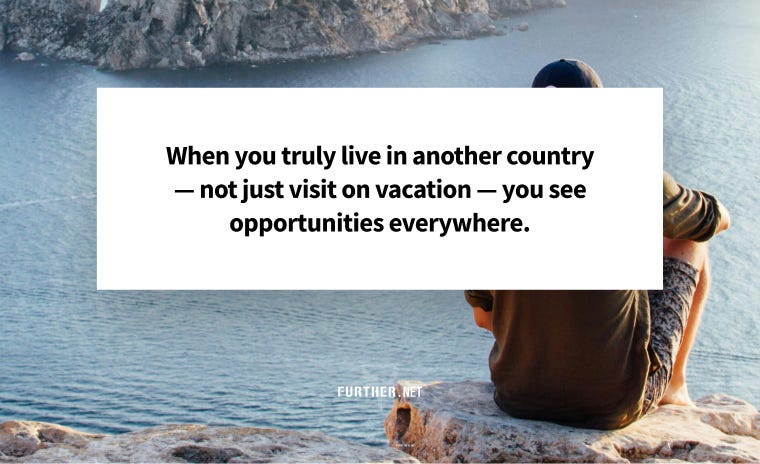The Benefits of Becoming an "Untourist"
Plus: Why You Can’t Sleep (And What to Do About It)
Welcome to this week’s issue of Further, a newsletter for people in their 50s and 60s looking for a more satisfying alternative to the mythical “golden years” retirement.
If you’re here and haven’t yet subscribed, join 19,000+ people looking to live their best life at midlife.
We've been exploring a better alternative to an increasingly unattainable traditional retirement for people in their 50s and early 60s.
It all begins with location-independent income, whether from freelancing, consulting, or some other form of digital business.
The personal enterprise approach strategically positions you for multiple sources of income and the ability to live wherever you choose.
But the economic opportunities don’t end with the business, no matter how many revenue streams you develop.
In fact, it opens an international door to an abundant array of opportunities that most people back “home” will never see.
The “Untourist” Approach to International Opportunities
Keep going-
P.S. New to Further? Join us here.
Visa Free Nomads
Getting out of the U.S. doesn't have to be a big scary hassle. There are several countries that have extended time periods that Americans can stay in the country simply on a tourist visa.
The term “tourist visa” is a bit misleading, because you don’t actually need to obtain a visa. This is just the amount of time your U.S. passport allows you to stay in a country as a tourist without a special visa or residency permit.
How Expats and Nomads Can Benefit from Long-Term Tourist Visas
Remote Control
Here are nine countries picked by a range of experts — including those who work with expat communities, international real estate specialists, and expat insurance providers — that offer the perfect backdrop for running your remote business.
The 9 Best Countries for Americans Running Remote Businesses Abroad
The Almighty Dollar
The conventional wisdom says tariffs hurt everyone.
Higher prices. Supply chain disruptions. Economic uncertainty.
And that will be the reality for U.S. citizens who stay put. It’s going to be painful, to say the least. But for location-independent entrepreneurs and digital professionals, the latest wave of Trump tariffs might offer an unexpected opportunity.
U.S. Tariffs Could Be a Windfall for Expats and Digital Nomads
Why You Can’t Sleep (And What to Do About It)
By Trudi Roth
Remember when our motto was “I’ll sleep when I’m dead”? (Thanks, Warren Zevon.)
Nowadays, that’s a little too close for comfort. Plus, who can sleep anyway? With all the chaos of modern life, shut-eye can be elusive.
However, understanding what’s undermining your rest isn’t just nice to do — it’s critical. After all, sleep is instrumental in healthy aging, from supporting immune and cognitive function to safeguarding against chronic illnesses (i.e., Type 2 diabetes, depression, heart disease) and dementia.
So, wake up and smell the science. While sleep quality diminishes as you age, you can take steps to get the rest you need.
Fire Up the Exhaust System
First, the meh news. Not only are older adults more susceptible to sleep disorders like insomnia and sleep apnea, but our slumber is impacted by hormonal changes, stress, and medical issues. This leads to less time in deep sleep, which is necessary for cellular repair and muscle and tissue growth.
Now, for some better news: some of the rest-related issues you might worry about aren’t really problems — you might be buying into some sleepy old myths. For example, frequent awakenings:
Adults usually move through five or six sleep cycles in a night, and it is entirely normal to wake up briefly at the end of each one. That means we might be waking up five times during the night. This can increase with older age and still be healthy.
Additionally, the adage that you need seven to nine hours of sleep a night is misleading — quality beats quantity. Knowing how much time you spend in deeper stages, including REM (dream state), helps you assess how “good” your sleep is (or not). A wearable (watch, ring) can help you spot your patterns and determine what throws you off most.
For example, I’ve noticed my best night's sleep starts with lights out by 10:00 pm. Any later, and I’m toast the next day because, like clockwork, I’m awake at 5:30 am, regardless of my bedtime.
Good Night Boon
Once you're in touch with your patterns, it’s time to get serious about getting better sleep, starting in the daytime:
Exercise is one research-backed intervention for getting more deep sleep. Research on middle-aged and elderly adults has shown that exercise promoted increased sleep efficiency and duration regardless of the mode and intensity of activity.
Additionally, practice good sleep hygiene:
Use the bedroom for sleeping (and sex) only.
Shut down screens well before bedtime.
No alcohol a few hours before bed.
Relax with herbal tea, meditation, or a hot bath.
And, you might consider acting on your unretirement dreams now — chances are you’ll sleep easier when your days are marked by less stress and greater satisfaction. Plus, much like not sleeping until you’re dead, putting off living on your terms is like sleepwalking through life.
The Sleep Stage That Suffers As You Age — And How To Get It Back On Track (MindBodyGreen)
An unbroken night’s sleep is a myth. Here’s what good sleep looks like (The Conversation)
further: flashback
🎶 Supertramp - The Logical Song, Breakfast in America, 1979 🎶
The Logical Song was written primarily by Supertramp's frontman Roger Hodgson, who based the lyrics on his experiences being sent away to boarding school for ten years. It's a song I loved when I was young, and it hits even harder at midlife. And that saxophone! (YouTube)
further: sharing
Enjoy this issue? Please forward this email to friends or share by clicking below.
Thank you for sharing Further!





💜